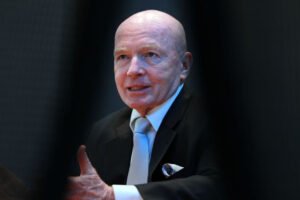Linkin Park: In the End Music Matters

Lucknow: Emily Armstrong’s entry into Linkin Park is an interesting development that could mark a new chapter in the band’s journey. To fully understand the significance of this change, it’s essential to trace the band’s origins, its impact on rock and alternative music, and how the addition of Armstrong could influence its future direction.
The Early Days of Linkin Park
Linkin Park was formed in 1996 in Agoura Hills, California, by three high school friends—Mike Shinoda, Brad Delson, and Rob Bourdon. Initially named Xero, the band struggled to find a sound that resonated with the changing landscape of music. They went through several line-up changes, adding Dave “Phoenix” Farrell on bass and Joe Hahn on turntables and samples. But the band’s final transformation occurred in 1999, when Chester Bennington joined as lead vocalist. His powerful and emotionally raw voice brought a new intensity to the band’s sound.

With their new line-up, Linkin Park signed with Warner Bros. Records and released their debut album Hybrid Theory in 2000. The album was a mix of nu-metal and rap-rock, a combination that wasn’t widely popular at the time. However, the band’s unique sound, blending Shinoda’s rap verses with Bennington’s soaring choruses and screams, catapulted them into mainstream success.
Rise to Fame
Hybrid Theory was a massive success, selling over 10 million copies in the U.S. alone. The singles “In the End,” “Crawling,” and “One Step Closer” became anthems for a generation dealing with emotional turmoil, identity crises, and societal pressures. The combination of heavy guitar riffs, electronic samples, and introspective lyrics helped the album resonate with a wide audience.
Their follow-up album, Meteora (2003), solidified their status as rock superstars. Songs like “Numb,” “Faint,” and “Somewhere I Belong” explored themes of alienation, anger, and self-reflection. The band’s ability to capture deep emotions and pair them with energetic, genre-blending music made them a favorite in both rock and alternative scenes.
Experimentation and Evolution
After Meteora, Linkin Park began experimenting with their sound. Their third album, Minutes to Midnight (2007), marked a significant departure from the rap-rock style that had defined them. With Rick Rubin as their producer, they embraced a more traditional rock sound, featuring softer ballads and more reflective lyrics. Tracks like “Shadow of the Day” and “Leave Out All the Rest” were a stark contrast to their earlier, more aggressive music. However, the album’s lead single, “What I’ve Done,” retained the energetic essence fans had come to expect.
The band continued to evolve with albums like A Thousand Suns (2010) and Living Things (2012), incorporating elements of electronica, industrial rock, and alternative pop. Despite these changes, Linkin Park remained commercially successful, although some critics and fans expressed disappointment with the band’s shift away from their heavier roots.

Chester Bennington’s Death and Its Aftermath
Perhaps the most defining moment in Linkin Park’s journey came in 2017 with the tragic death of Chester Bennington. Bennington’s passing shocked fans and the music world alike, leaving the future of the band uncertain. The release of their seventh studio album, One More Light (2017), just months before Bennington’s death, showed a more pop-oriented and introspective side of the band. Songs like the title track, “One More Light,” and “Heavy” were emotionally charged, reflecting themes of vulnerability, pain, and personal struggle.

After Bennington’s death, the surviving members took a hiatus, unsure whether they would ever continue as a band. They held a tribute concert in Bennington’s honor, but the question remained—could Linkin Park move forward without the man who had been their emotional core?
Emily Armstrong’s Entry into Linkin Park
Enter Emily Armstrong, the lead vocalist of the rock band Dead Sara. Known for her gritty, powerful voice and stage presence, Armstrong has built a reputation as one of the most dynamic frontwomen in modern rock. Her band, Dead Sara, combines hard rock with punk energy, a style that has drawn comparisons to the early days of Linkin Park.
Armstrong’s addition to Linkin Park raises several intriguing possibilities. First, her voice, while different from Bennington’s, shares some of the same emotional intensity and rawness. Armstrong’s vocal delivery is unflinchingly passionate, often drawing from deeply personal experiences, which aligns with Linkin Park’s history of vulnerable and emotionally charged songwriting.
Second, Armstrong’s background in alternative rock and punk could bring a new edge to Linkin Park’s sound. While the band has explored a wide range of musical styles over the years, including electronic, pop, and industrial influences, Armstrong’s presence might signal a return to a more raw, rock-oriented approach.
What This Means for Linkin Park’s Future
There are several factors to consider when evaluating what Emily Armstrong’s entry could mean for the future of Linkin Park:
- New Creative Energy: Armstrong’s addition introduces a fresh dynamic to the band’s songwriting and performance. She brings a new perspective and energy, which could inspire the band to experiment further with their sound. This collaboration might result in a new fusion of styles, possibly blending their older nu-metal roots with the harder, alternative rock edge Armstrong is known for.
- Evolution of the Band’s Sound: With Armstrong in the mix, the band may return to a grittier, rock-centric sound that balances both heaviness and melody. Fans of their earlier albums may welcome this, as it offers a chance for the band to reconnect with the intense emotion and sonic aggression that defined their early work.
- New Vocal Chemistry: Armstrong’s vocal range and style complement Mike Shinoda’s rap verses, potentially opening the door for a new dynamic in how the band approaches vocal interplay. The dual-vocal format that worked so well for Bennington and Shinoda might evolve into something fresh with Armstrong’s contribution.
- Connection with Fans: One of Linkin Park’s greatest strengths has always been their ability to connect with their audience on a deep emotional level. Armstrong’s heartfelt, often soul-baring performances could continue this tradition, ensuring that the band remains a conduit for emotional expression, even in Bennington’s absence.
- Challenges Ahead: Of course, there are challenges. Chester Bennington was an irreplaceable figure, and many fans may find it difficult to accept a new vocalist in his place. However, the band has never been afraid to take risks or to evolve, and Armstrong’s entry could be the catalyst for a new era that honors their past while moving forward.
Emily Armstrong’s addition to Linkin Park could herald a transformative phase for the band. Her voice, musical background, and stage presence are strong assets, and while Bennington’s loss is irreplaceable, Armstrong brings with her a new vitality that could help propel the band into its next chapter. Fans and critics alike will watch closely to see how this new line-up shapes Linkin Park’s future music.
The journey of Linkin Park has been one of constant reinvention, from their early days pioneering nu-metal to their evolution into a genre-blending force. Armstrong’s arrival signals that the band is ready to continue pushing boundaries, exploring new sonic landscapes, and maintaining their status as one of the most innovative acts in modern rock. Whether or not she marks the beginning of a new golden era for Linkin Park remains to be seen, but one thing is clear: the band’s journey is far from over.









